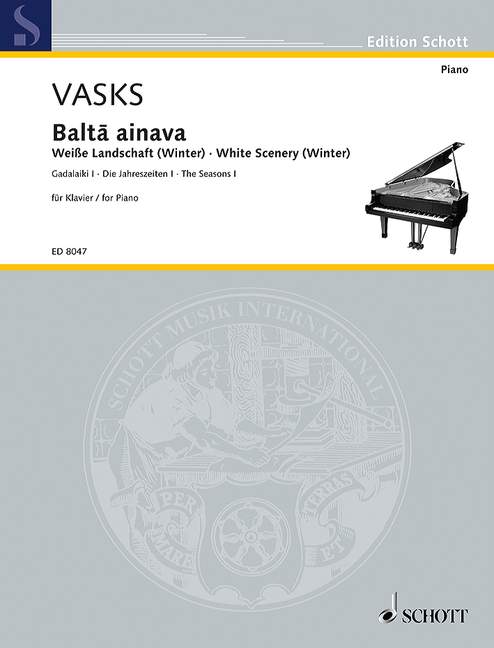
Balta ainava (White Scenery (Winter)) 瓦斯克斯 鋼琴獨奏 朔特版
彼得斯-瓦斯克斯在波羅的海作曲家圈中佔有特殊地位。 他不僅是拉脫維亞有史以來最重要、最受歡迎的作曲家,而且總是以一種狂熱的激情向聽眾傾訴,似乎指向某種更高的東西。 毫無疑問,這種更崇高的東西既高於人類世界,也存在於每個人的內心:神性。 "我深深植根于自然,植根于北方的自然。它影響著我所有的音樂。我們所瞭解的大自然也是多種多樣的;我們有非常分明的四季。 冬天很長,夏天很短,因此更加美麗和令人嚮往。中間的季節則頗具戲劇性"。 彼得斯-瓦斯克斯的第一首《四季》並不是為了組成一個完整的樂章而創作的。 1980 年,他為朋友塔利瓦爾迪斯-德克斯尼斯(Talivaldis Deksnis)創作了《白色風景(冬)》(Balta ainava),1981 年創作了《秋樂》(Rudens muzika),1995 年創作了《春樂》(Pavasara muzika)。2008 年,《綠色風景(夏)》(Zala ainava)問世,完成了整個週期的創作。 2009 年,作為 "安可曲",瓦斯克斯根據舊草圖創作了《夏夜音樂》(Vasaras vakara muzika);在所有作品中,這首作品最能體現傳統。只有兩首最新的作品--都與夏天有關--有固定的節拍結構。 早期的三部作品則是自由節拍,沒有小節線,因此具有即興創作的特點。 瓦斯茨在談到這部作品時說:"在 Balta ainava 中,一切都是自由的: "在巴爾塔阿納瓦,一切都是白色的。新的一年開始了。這是一個安靜的冥想,一個新的開始,只有兩個主題。Pavasara muzika。Quasi una Sonata》是這首樂曲中要求最高的作品,曲調強烈,發展令人印象深刻。 春天姍姍來遲,充滿戲劇性。 它就像一場戰鬥,直到結束。這首帶有鳥鳴的多面性樂曲從衝突和戲劇性的強化中誕生,最後在狂喜中結束。Zala ainava》基於兩個主題。我們的夏天非常短暫,是戰鬥之後的喘息之機。它是如此美麗!音樂反映了歡樂和滿足。第一個主題帶來了一種純粹的活力;第二個主題則更多地表現了音色。最後,樂曲引用了一首著名的拉脫維亞民謠中關於醉漢的五個音符。Rudens muzika》在寧靜的九月天,在祥和、陽光明媚的氣氛中以鋼琴小調開始。 現在,秋天的暴風雨席捲了大地;人們和大自然都沉浸在溫柔的悲傷之中,放棄了自己的輝煌。 在最後一場大風暴之後,雪再次降臨,象徵著淨化的結束和新的開始。Vasaras vakara muzika 發生在夏日寧靜的尾聲。夕陽西下。緩慢。對之前經歷的回憶浮現。隨著回憶的出現,強度也隨之增加。最後,人們聽到了一首民謠:"我們在暴政時期倖存下來,並保留了我們的身份"。結局是安靜的,一切都沉睡了"。克裡斯托夫-施呂倫 譯者:約翰-派翠克-湯瑪斯和 W. 理查-雷蒙德 約翰-派翠克-湯瑪斯和 W. 理查-裡夫斯
作曲家: Vasks, Peteris
樂器: piano
出版社: Schott Music
原文簡介:
Peteris Vasks occupies a special position in the circle of Baltic composers. He is not only the most significant and popular composer ever to come out of Latvia; he always speaks to his listeners with a fervent intensity that seems to point to something higher. This higher aspect is without a doubt something that stands above the world of humanity but is also present within each person: divine nature. “I am deeply rooted in nature, in the nature of the North. It influences all of my music. The nature we know is also quite various; we have four very distinct seasons. The winter is very long, the summer very short and therefore all the more beautiful and longed for. The seasons in between are quite dramatic.” The first of Peteris Vasks’s Seasons pieces was not written with the intention of forming a complete cycle. For his friend, Talivaldis Deksnis, he composed in 1980 Balta ainava – White Landscape (Winter), in 1981 Rudens muzika – Autumn Music, and in 1995 the Pavasara muzika – Spring Music. In 2008, Zala ainava – Green Landscape (Summer) came into being, the piece which completed the cycle. In 2009, as a kind of “encore“, Vasks wrote Vasaras vakara muzika – Music for a Summer Evening based on old sketches; this, of all the pieces, is the one most anchored in tradition. Only the two newest pieces – both of which have to do with summer – have a fixed metrical structure. The three earlier works are metrically free, notated without bar lines, which gives them an improvisatory character. Vasks says of the individual pieces in the cycle: “In Balta ainava everything is white. A new year begins. It is a quiet meditation, a new beginning, with only two themes. Pavasara muzika. Quasi una Sonata – the most demanding piece in this cycle – is intense, an impressive development. Spring comes slowly, with much drama. It is like a battle, until it is simply there. This multi-faceted piece, with its bird songs, lives from conflicts and dramatic intensification and ends in ecstatic rapture. Zala ainava is based on two themes. Our summer is very brief and offers a respite after the battles. And it is so beautiful! The music reflects joy and contentment. The first theme brings a kind of pure energy; the second is more devoted to tone painting. At the end, a five-note quotation from a well-known Latvian folksong about a drunkard is heard. Rudens muzika begins pianissimo on a quiet September day, in a peaceful, sunny atmosphere. Now the autumn storms sweep over the land; a gentle sadness settles on the people and on nature, which surrenders its splendor. After a last great storm, the snow comes again as a symbol of purified conclusion and a new beginning. Vasaras vakara muzika takes place at the quiet end of a summer day. The sun sets. Slowness. Memories of previous experiences surface. With the memories’ appearance comes an increase in intensity. Towards the end, a kind of folksong is heard: ‘We have survived the time of tyranny and retained our identity’. The ending is quiet, everything is asleep.“ Christoph Schlüren Translation: John Patrick Thomas and W. Richard Rieves
